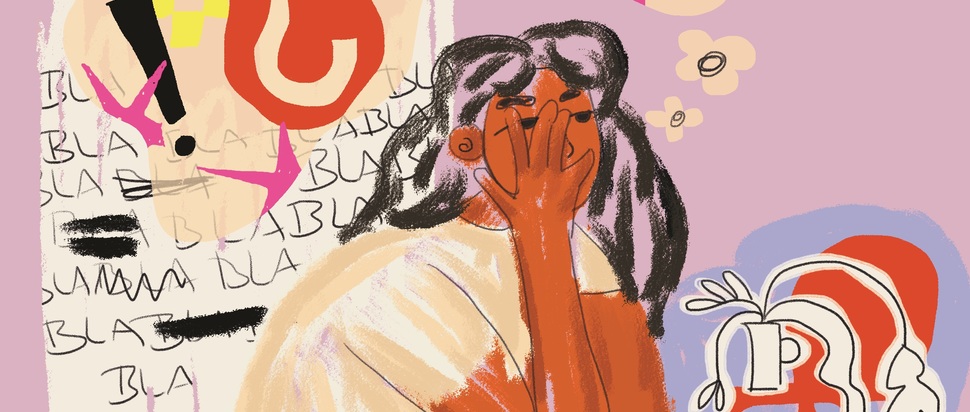Structures in Mind: on women's experiences with ADHD
The conversation around ADHD is increasingly opening up – but there's still a lot that goes unsaid. We speak to women about their experiences with diagnosis, the structures which dominate, and workplace professionalism
What do the patriarchy, racism, and capitalism have to do with ADHD? It turns out quite a lot.
For women and folk from marginalised genders, approaching your GP to talk about a potential ADHD diagnosis can be frustrating. Susan, a medical student, told me that “the first GP I spoke to basically laughed in my face, saying there was no way I could be studying medicine and have ADHD. I left feeling like I had embarrassed myself, and that feeling sat with me for a long time.”
That feeling of embarrassment, brought on when you finally reach out and ask for some help, is very familiar. “Were there any significant moments in your childhood that you can think of?” a psychiatrist asked me last week during an assessment for ADHD medication. I wasn’t sure how to answer so I talked about my father trying to burn the house down with me in it. Then I worried I’d been overly personal, and found myself sweating through my t-shirt with anxiety and embarrassment, running through my response in my head. I felt my face burning up; I was unable to focus; the psychiatrist’s words were just background noise to my own internal voice. I’m not sure what I expected, but I left their office with tears streaming down my face. Part relief at feeling heard by a professional for the first time, part devastating embarrassment from feeling like I had overshared.
Of course, I hadn’t. And, similarly, Susan would go on to receive a formal diagnosis some years after that initial GP appointment. But as women we’ve been taught to feel embarrassment or shame about being different – even if that difference comes from experiences inflicted upon us, completely out of our control. The embarrassment we feel trying to get support is created by the (patriarchal) world around us.
I spoke to some other incredible women about their experiences of navigating a late diagnosis of ADHD. Kyla says, “A lot of people who don’t fit in the diagnostic criteria and ones who have a later life diagnosis, typically women, may come from a rough family life, or just not having the support system in school or wider society. The internalised ableism and the intense critical lines are then masking trauma so hard to fit in and to fix themselves and to be better.”
Masking typically involves covering up your ADHD symptoms, often mirroring those around you, requiring intense and exhausting concentration. But Kyla’s words made me realise that the brilliant job I had done of masking the trauma of a chaotic and complicated childhood was also playing out by masking my ADHD. And so, late ADHD diagnosis isn’t just about uncovering the masking we’ve done to fit in: it’s also about uncovering the masking we’ve done to hide trauma.
For Charlene, her experiences of seeking diagnosis have been even more complex. “As a Black woman, that caricature of a young white boy with ADHD being disruptive in school, I am so far from that stereotype that I don’t think I was ever taken seriously.” Charlene’s experiences reflect the racial health gap within the UK, in which Black people and People of Colour are not offered the same health support as white people. Despite spending the last four years chasing a diagnosis, Charlene has never been given the opportunity to be seen by a psychiatrist. “I was put on a waiting list at one point, but when I moved house of course that all got juggled around and lost. I don’t have the energy to keep chasing.” My two-year-wait for a diagnosis seems small in comparison. For Charlene and many others, self-diagnosis is the only diagnosis they may ever get. Of course, this means medication is not available.
But getting to the stage of medication is not without its complications. Kyla recalls: “Day one of trying meds I cried about three times just from the sheer quiet of my brain and [that] I could focus on my work. The whole purpose of the meds is to be able to focus on work in the workplace and that’s gross and capitalist and frustrating.”
I think about that focus on work a lot. If the world we lived in were less ableist, if I was allowed to work in fits and starts, to exist chaotically, to ‘overshare’ in professional settings without being engulfed by embarrassment, perhaps the urge to seek medication would be less. If the world allowed women to exist without the need to fit into a capitalist 9 to 5 regime, I’d never have ended up on this ADHD journey.
The women I spoke to talked about feeling overwhelmed, stressed and exhausted. But if the patriarchal structures which force intense masking on women with ADHD, the racist structures that disallow PoC equal access to medical treatment, and the capitalist structures ableist ways of working were dismantled, would those feelings remain? My guess is not.
